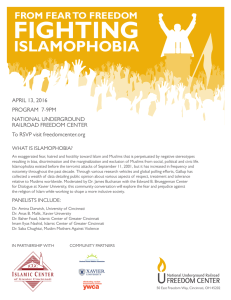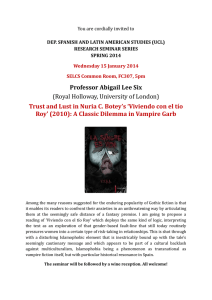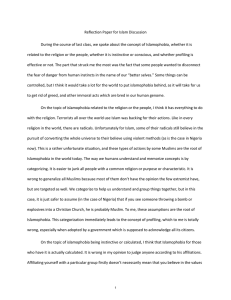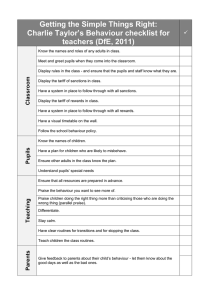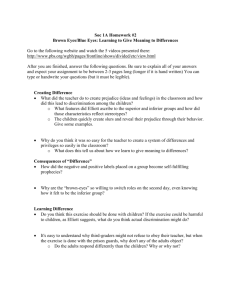‘jokes’: Responding to Islamophobic comments or
advertisement
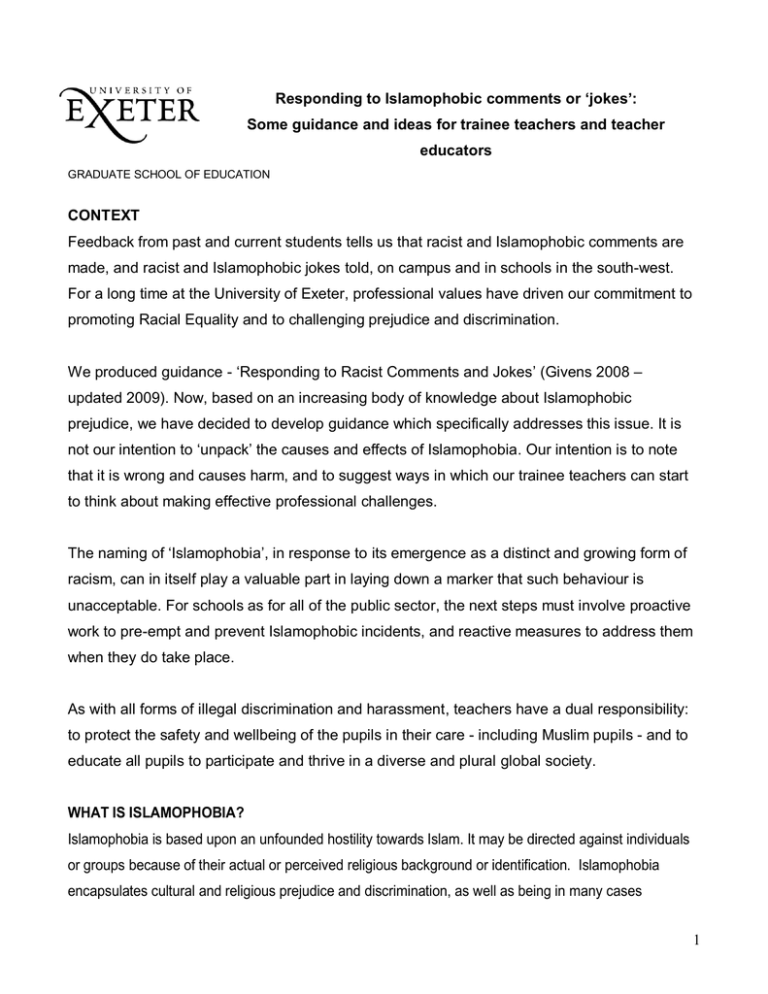
Responding to Islamophobic comments or ‘jokes’: Some guidance and ideas for trainee teachers and teacher educators GRADUATE SCHOOL OF EDUCATION CONTEXT Feedback from past and current students tells us that racist and Islamophobic comments are made, and racist and Islamophobic jokes told, on campus and in schools in the south-west. For a long time at the University of Exeter, professional values have driven our commitment to promoting Racial Equality and to challenging prejudice and discrimination. We produced guidance - „Responding to Racist Comments and Jokes‟ (Givens 2008 – updated 2009). Now, based on an increasing body of knowledge about Islamophobic prejudice, we have decided to develop guidance which specifically addresses this issue. It is not our intention to „unpack‟ the causes and effects of Islamophobia. Our intention is to note that it is wrong and causes harm, and to suggest ways in which our trainee teachers can start to think about making effective professional challenges. The naming of „Islamophobia‟, in response to its emergence as a distinct and growing form of racism, can in itself play a valuable part in laying down a marker that such behaviour is unacceptable. For schools as for all of the public sector, the next steps must involve proactive work to pre-empt and prevent Islamophobic incidents, and reactive measures to address them when they do take place. As with all forms of illegal discrimination and harassment, teachers have a dual responsibility: to protect the safety and wellbeing of the pupils in their care - including Muslim pupils - and to educate all pupils to participate and thrive in a diverse and plural global society. WHAT IS ISLAMOPHOBIA? Islamophobia is based upon an unfounded hostility towards Islam. It may be directed against individuals or groups because of their actual or perceived religious background or identification. Islamophobia encapsulates cultural and religious prejudice and discrimination, as well as being in many cases 1 prejudice based on skin colour and / or other visible physical characteristics. In this sense it is complex – a prejudicial response to ethnic, cultural and religious differences. Anti-Muslim prejudice and racism is based upon claims that Islam is an „inferior‟ religion and a threat to the dominant values of society. It results in unfair discrimination, harassment and sometimes physical assault, and can bring about the exclusion of individuals or groups from the mainstream areas of social, economic or political life. Islamophobia and anti-Muslim prejudice and racism may take the form of: name-calling; offensive „jokes‟; cultural or religious insensitivity; verbal assault; graffiti; intimidation; exclusion; discrimination; denial of services and entitlements; physical assault. WHY RESPOND TO ISLAMOPHOBIA? For many years, schools have been bound by legislation to make effective responses to challenge prejudice and racially motivated bullying and assault. Under the Race Relations (Amendment) Act (2000), schools had a duty to promote good race relations and equality of opportunity. Since September 2007, all maintained schools have had a duty to promote community cohesion – „Every school – whatever its intake and wherever it is located – is responsible for educating children and young people who will live and work in a country which is diverse in terms of cultures, religions or beliefs, ethnicities and social backgrounds’. The new Equality Act (2010) introduces provisions outlawing discrimination on the grounds of religion or belief. This specifically includes education in schools. The Act covers direct and indirect discrimination: 2 Direct discrimination on grounds of religion or belief - occurs when someone is given less favourable treatment on those grounds than someone else of another religion or belief, or none, receives or would receive, where there is no relevant difference in their circumstances. Indirect discrimination on grounds of religion or belief - occurs when a provision, criterion or practice is applied to everyone but has the effect of putting people of a particular religion or belief, or none, at a disadvantage, and it cannot reasonably be justified on other grounds. The complainant must actually have suffered that particular disadvantage though: it cannot be merely hypothetical. Alongside this, individual teachers have a duty of care to all of their pupils, and the National Curriculum requires that teachers prepare pupils to be „confident global citizens‟ (e.g. QCA 2007a, 2007b) There are often formal structures within institutions to address prejudice that is directed towards a specific individual. For example the University of Exeter has a Policy for the Protection of Dignity at Work and Study (http://www.exeter.ac.uk/staff/equality/harassment/protectingdignity/), with a network of harassment advisors (http://www.exeter.ac.uk/staff/equality/harassment/network/), and a reporting system for discrimination („Speak Out‟ leaflets are available at key locations on campus, and there is also a webpage for Online Reporting incidents of discrimination).. Schools are required by law to have a system for recording and reporting racist incidents, and this includes Islamophobic incidents and other forms of faith based discrimination. Trainees and teachers should familiarise themselves with the systems in place in their school. Islamophobic comments or jokes that are not obviously against a particular individual, and are often made in the absence of anyone with a Muslim background, may require a different sort of response. 3 There are a number of professional reasons for responding, which include: To remain silent risks collusion with underlying prejudicial assumptions, stereotypes or intentions. Approximately one fifth of the human family is contained under the complex label „Islamic‟. In an increasingly globalised world, teachers do a disservice to the pupils in their care if they don‟t equip them with attitudes and values that allow them to function effectively, both morally and economically, in our global village The GTCE Code of Conduct & Practice for Registered Teachers Oct 2009 (http://www.gtce.org.uk/documents/publicationpdfs/code_of_conduct_1009.pdf) includes an explicit expectation that teachers should: “Demonstrate respect for diversity and promote equality‟, and includes a duty to „address unlawful discrimination, bullying, and stereotyping, no matter who is the victim or perpetrator‟. The Professional Standards for QTS (in particular Q1, Q2, Q3, Q18, Q19) The Professional Standards for other stages in a teacher‟s career, e.g. „Core‟ (NQT Induction: C1, C2, C3, C18, C19…), Post-Threshold (P1, P2 etc), Excellent Teacher (E1, E2, etc), Advanced Skills Teacher (A1, A2, etc) Under the Equality Act (2010) schools “have a positive legal duty to eliminate unlawful discrimination and promote equality of opportunity” Teachers must play their part in enabling schools to fulfill these duties Islamophobia is an issue for all schools, regardless of their demographic. Teaching about racism and Islamophobia can have a profound effect on pupil‟s understanding and attitudes. The GTCE Code of Conduct & Practice for Registered Teachers Oct 2009 states: ‘teachers have a profound and lasting influence on the development and life chances of children and young people. Their knowledge, skill, judgement, creativity and commitment play a vital role in society’. 4 Effectively challenging Islamophobia helps to break down dominate racial and faith based stereotypes which cause harm, and equips young learners with the skills, competencies and attitudes that they need to thrive in the 21 st century. RESPOND HOW? There are of course no right and wrong answers, and what we are offering here is simply guidance and some ideas. We welcome feedback on this guidance, and hope to review, modify and develop this guidance as our own expertise grows. Each educator has to exercise judgment in the face of an Islamophobic comment or joke, and to take a proportionate course of action based on that judgment. This guidance seeks to offer a framework to underpin such judgments. 1. Short term and long term It is useful to think of long term as well as short term goals. For example, a short term goal may simply be: to lay down a marker, indicating that we have heard the joke or comment and noticed its Islamophobic overtones to challenge inaccuracies underlying the joke or comment (e.g. myths, stereotypes, misinformation). For example, a common form of Islamophobia is to assume that Islam is a monolithic, homogenous faith. This is far from the truth. While there are core values, there are several sects within Islam, and interpretation varies in response to many factors including: sect, culture, geography and politics. There are also substantial variations in how this is interpreted by Muslims within different sects to make it clear that we find such jokes / comments inappropriate, particularly in school / University to ensure that victims receive support and that perpetrators are challenged. 5 while your longer term goal may be: to educate about race and faith equality, the damaging costs of racial and religious discrimination and harassment, and the benefits of racial equality and ethnic and faith diversity. DfES guidance (DfES 2000) makes clear the need for schools ‘to provide a safe environment’ for all pupils, parents and staff. Specifically, the DfES guidance highlights the potential risk of heightened ‘tension between pupils, parents and staff from different ethnic backgrounds or religions’ and alerts schools to the possibility of ‘extremist groups in a locality …(seeking) to stir up tensions in the area’. Excessive fear is likely to have a damaging impact on the behaviour of pupils and staff at school. 2. Terms of your response The terms in which you respond will depend on your authority relationship with the perpetrator of the comment or joke: this depends on whether you are dealing with a pupil, a peer, or a colleague within whose authority you work / study. 3. Behaviour management issues When pupils make racist and Islamophobic jokes or comments, there are often behaviour management implications. Don‟t be frightened to respond in much the same way as you would to all serious issues where pupil‟s behaviour falls short of reasonable expectations. Much of the guidance about behaviour management is directly relevant, e.g. Familiarise yourself with the school policies and procedures relating to racist comments, incidents and harassment; don‟t wait until you need them If in doubt, seek advice. Asking for help, guidance and support is a sign of strength Do use the reporting procedures that are in place, when appropriate A measured short term response often leaves a door open to pursue a longer term goal. An initial response based on scorn, vilification or heavy-handed sanctions often closes that door. This is not to say that a pupil who persists with Islamophobic jokes or 6 comments should not face sanctions. They should. Use the right sanctions – be specific, not general, in the reprimands you use. Make sure they are in keeping with whole school policies and stick with them Challenge / problematise the behaviour, not the person Always follow through and don‟t make threats you can‟t fulfill. Do carry through any warnings or sanctions that you impart. Seek guidance from experienced colleagues pupils are sometimes surprised that teachers talk to each other and that their poor or unacceptable behaviour is flagged up to others Seek opportunities to pre-empt unwanted behaviour wherever possible Stay calm and rational: if a pupil is angry / is losing or has lost control and is expressing this through Islamophobic comments and behavior, your best tactic is to meet this with a calm and rational response. You can express your anger – but calmly If it seems appropriate, say that the comment has been noted, is unacceptable, and that there will be follow up at a later date / time (this can create a window of opportunity for a more considered response and the chance to talk through the best response with others as appropriate) It goes without saying that you need to model good behaviour (polite and respectful) in order to receive it and to make it the norm in your classroom. 4. Consistently requiring reconsideration Being consistent is hard, but it is also very powerful. If you consistently name Islamophobia as unacceptable, and consistently invite pupils or colleagues to reconsider an Islamophobic joke or comment that they have made or heard, then you stand the best chance of making a difference. You will not always convince someone straight away, but you may cause them to think about what you have said. If you persevere in naming discriminatory behaviour, people will come to anticipate your comments and may in time choose to express themselves differently. You might find the examples below helpful as you think through the types of responses you would feel comfortable about using. Not all of the examples below are without risk- some may elicit anger; in the bigger picture, ignoring Islamophobic comments isn‟t risk free either. 7 'This is how I feel about that‟ One way of responding to discrimination is to say how it makes you feel. You may want to say, for example, 'When you speak like that, I feel angry' or „hearing that makes me feel uncomfortable; I'd prefer it if you didn't use that sort of language'. While people may not see why you have these feelings, they cannot deny that you have them. And once they discover how you feel, this may give them some insight into how their behaviour affects others. „That‟s an anti-Muslim remark.‟ This is a straightforward response. It is clearer and more direct than the cautious „Sounds a bit off to me‟ or the sarcastic „Some people round here have never heard of equal opportunities‟ or the angry „Don‟t be so racist!‟ !f you decide to name discrimination when you encounter it, be prepared to explain yourself: the other person may not see it as such. A clear and direct explanation may avoid you and/or the other person from being driven into aggressive or defensive positions. It‟s sensible then to think this through for yourself now – in the very early stages of your teaching career – so that you don‟t have to do it „on the hoof‟ when you are faced with a real situation in school. „What do you mean?‟ A lot of discriminatory behaviour is presented in the form of jokes, innuendoes, hints or suggestive gestures. Sometimes these are malicious but more often they arise from thoughtlessness or habit. Simply asking for an explanation may encourage someone to review their behaviour. For example, you might ask: „Can you explain that to me?‟ or, „What do you mean?‟ or „Can you explain to me what the joke is?‟ or „Why is that funny?‟ These questions can be confronting. If the joke is stripped away, people are faced with the real implications of what they are saying. You need to be prepared for strong reactions if you use this method of responding. 'Would you say that to a Christian?' „What difference does their faith or culture make?‟ Many people are genuinely unaware of ways in which their behaviour is discriminatory; they may generalise about Muslims without thinking about what they are doing or saying, and how hurtful or 8 damaging it might be. Asking them if they would behave in the same way towards someone from a different group can show people their hidden prejudicial assumptions. 5) Looking after the victim It‟s important that anyone negatively affected by an Islamophobic „joke‟, comment or incident should be taken care of after the incident. As a student teacher you have a 'duty of care' towards your pupils. This includes making sure that the victim knows that you and the school take the incident seriously, that they have someone to talk to and they know what is going to happen next. It is usually best to do this in discussion with senior colleagues and in line with school policy. 6) Weave anti-racist practice and thinking into your own teaching The best way to challenge racism is long term, by creating opportunities to expose it for what it is – based on anger, misinformation, prejudice, habit and inaccuracies – and to build a different way of thinking and viewing the world. Teachers are in an enviable position of being able to challenge racism and prejudice through their teaching and their pupils learning. Take every opportunity to build good global learning practice into your teaching. Use the myriad of support and resource materials available to you, depending on which region you teach in. DISTINCTION BETWEEN CLOSED AND OPEN VIEWS OF ISLAM It is not your job to ensure that no one is allowed to express their disagreement with aspects of Islam, in much the same way as you wouldn‟t disallow anyone the right to express disagreement with aspects of other world faiths. It is useful to have an awareness of the difference between closed views of Islam on the one hand, and open views on the other. Absolute disagreement with and phobic dread of Islam, coupled with a lack of respect and appreciation, and persistent misinformation, are characteristics of closed views of Islam. Appreciation and respect, sometimes alongside legitimate disagreement and debate, are characteristics of open views. There are significant differences and variations within the world of Islam – it is not a monolithic culture, state or faith. Closed views of Islam do not appreciate or respect this pluralism, and sweeping and harmful generalisations and stereotypes are 9 made. Any instance in which individual Muslims are judged to have behaved badly are then used as examples to condemn all Muslims. Clearly this is wrong. CONCLUDING THOUGHTS There is a need, most obviously and immediately, for schools to give support and assistance to young people who are experiencing Islamophobic bullying, abuse and assault. Young people who engage in Islamophobic verbal and physical abuse have to be challenged and stopped. Teachers have to develop a range of skills, understandings and qualities to provide this support and to effect this challenge. This briefing paper does not provide all the answers by any means, but it does highlight some possibilities, and it underlines the need for teachers to get better at coping with controversy and complexity. It involves knowing, amongst other things, that fairness and equality is worth fighting for in our schools, and the law requires that we do just that. SOME USEFUL REFERENCES This is by no means an exhaustive list, but some ideas for you if you want to research further, or build up your own bank of teaching resources around this issue. Claire, H. & Holden, C. (Eds). (2007) The challenge of teaching controversial issues. Stoke on Trent: Trentham Books, particularly the final chapter: Dean, B. & Joldoshalieva, R. Key strategies for teachers new to controversial issues DCSF (2007), the Guidance on the duty to promote community cohesion (ref 005982007-DOM-EN), from http://publications.education.gov.uk/default.aspx?PageFunction=downloadoptions&Pag eMode=publications&ProductId=DCSF-00598-2007& or http://www.teachernet.gov.uk/docbank/index.cfm?id=11635 DfES (2000) Guidance after the events of 11 September (London: DfES) FAIR UK: http://www.fairuk.org/.htm - includes a training pack on Islamophobia 10 GLEAN (Global Learning Network South West) http://www.glean.org.uk can provide links and resources GTCE (2009) Code of Conduct and Practice for Registered Teachers http://www.gtce.org.uk/teachers/thecode/ Multiverse: http://www.multiverse.ac.uk – a provision designed specifically for student teachers and their tutors: a wealth of materials available, searchable by topic and by QTS Standard QCA (2007a) Citizenship programme of study for key stage 3 and attainment target 9an extract from the national Curriculum 2007). London: QCA. QCA (2007b) Citizenship programme of study for key stage 4 and attainment target 9an extract from the national Curriculum 2007). London: QCA. Teachernet: links to resources concerning Racism, Antisemitism and Islamophobia at http://www.teachernet.gov.uk/wholeschool/behaviour/tacklingbullying/racistbullying/deve loping/racismantisemitism Teachers TV: –a programme on young people and footballers speaking out against racism and Islamophobia (24 April 2009), from http://www.teachers.tv/videos/islamophobia Teaching about Islamophobia www.theiceproject.com Sara Bennett & Nick Givens – July 2010 11

